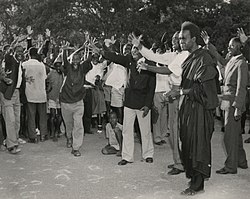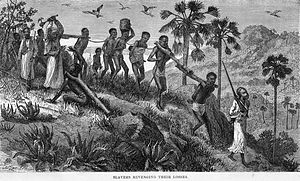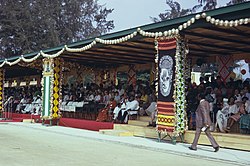Portal:Pan-Africanism
IntroductionWelcome to the Pan-Africanism portal!
Bienvenue sur le portail panafricanisme!   Pan-Africanism is a worldwide movement that aims to encourage and strengthen bonds of solidarity between all indigenous peoples and diasporas of African ancestry. Based on a common goal dating back to the Atlantic slave trade, the movement extends beyond continental Africans with a substantial support base among the African diaspora in the Americas and Europe. Pan-Africanism can be said to have its origins in the struggles of the African people against enslavement and colonization and this struggle may be traced back to the first resistance on slave ships—rebellions and suicides—through the constant plantation and colonial uprisings and the "Back to Africa" movements of the 19th century. Based on the belief that unity is vital to economic, social, and political progress, it aims to "unify and uplift" people of African ancestry. (Full article...) Selected article African nationalism is an umbrella term which refers to a group of political ideologies, mainly within Sub-Saharan Africa, which are based on the idea of national self-determination and the creation of nation states. Selected biography Aminata Mbengue Ndiaye is a Senegalese politician. In 2012, she was appointed Minister of Livestock and Animal Production in the Mbaye government. She also serves as mayor of Louga, and is currently chair of the women's movement of the Socialist Party of Senegal Selected history The Arab slave trade was the intersection of slavery and trade in the Arab world, mainly in Western Asia, North Africa, East Africa and Europe. This barter occurred chiefly between the medieval era and the early 20th century. The trade was conducted through slave markets in these areas, with the slaves captured mostly from Africa's interior and Southern Europe. Selected cultureThe term Caribbean culture summarises the artistic, musical, literary, culinary, political and social elements that are representative of the Caribbean people all over the world. The Caribbean's culture has historically been influenced by that of African and Amerindian traditions. It has also been strongly influenced by that of its linguistic, economic, and cultural neighbor, the United States. As a collection of settler nations, the contemporary Caribbean has been shaped by waves of migration that have combined to form a unique blend of customs, cuisine, and traditions that have marked the socio-cultural development of the area. Selected imagesOrganisationsAll-African People's Revolutionary Party · African Society for Cultural Relations with Independent Africa · African Unification Front · African Union · African Queens and Women Cultural Leaders Network · Conseil de l'Entente · Convention People's Party · East African Community · Economic Freedom Fighters · Global Afrikan Congress · International African Service Bureau · International League for Darker People · Organisation of African Unity · Pan African Association · Pan-African Congress · Pan Africanist Congress of Azania · Rassemblement Démocratique Africain · Pan Africa Chemistry Network · Pan African Federation of Accountants · Pan-African Freedom Movement for East and Central Africa · Sahara and Sahel Observatory · UNIA-ACL · ZANU–PF
See also
& Festivals Photo by Helinä Rautavaara (1977) Publications
Films and TVAudios and videosDid you know ...that the colours of the Flag of Benin (pictured) allude to the Pan-Africanist movement and pay tribute to Ethiopia, the oldest independent country in Africa?
Selected quotesIn his "Whirlwind Message", the First Message to the Negroes of the World from Atlanta Prison (10 February 1925), Marcus Garvey delivered the following message:
Pan-Africanism topicsCategoriesThings you can do
Related portalsAssociated WikimediaThe following Wikimedia Foundation sister projects provide more on this subject:
Discover Wikipedia using portals | |||||||






























